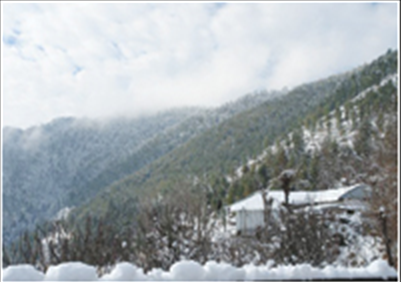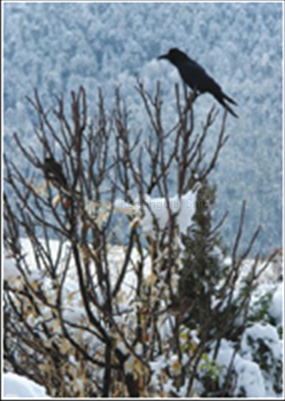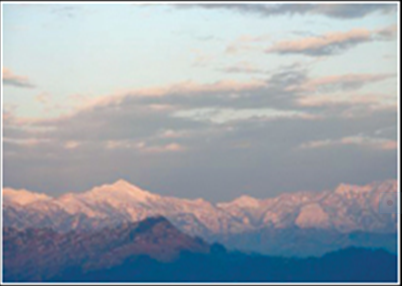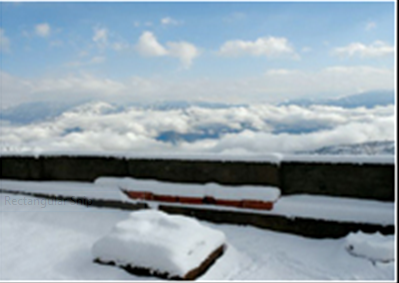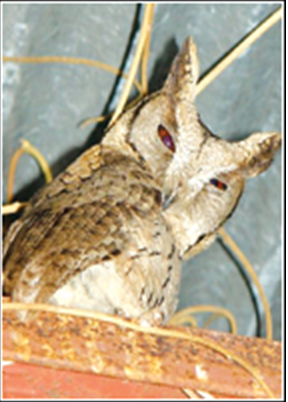Bhurban
This is a collection of articles archived for the excellence of their content. Readers will be able to edit existing articles and post new articles directly |
Bhurban
Photo feature: The big freeze
Text and photographs by Zahrah Nasir
The world is a freezer in which the temperature drops even lower every night here in Bhurban at an altitude of 6,000 feet where winters are always cold… but not like this.
Normally we get an invigorating cover of insulating snow before temperatures drop below zero and the snow acts as natural insulation for houses, the land on which they sit and for the all important, underground, water supply. This time around, however, it snowed, thawed, snowed, thawed again and just when the exposed ground was at its most vulnerable, temperatures plummeted like never before and everything froze. Minus 12C and icebound; above ground water pipes are either frozen solid or have burst and the underground water supply is frozen, too. The few people around are melting ice to drink – if it snows again now we are all in trouble!
The majority of mountainside inhabitants in this particular location migrate down to the warmer climes of Rawalpindi for the winter months, finding it more economical to live in rented accommodation there than purchase firewood and get in food stocks up here. But, just a few of us are stubborn enough to hang on, come what may, although I strongly suspect that after the current bone-chilling experience is over then a few of the diehards will migrate when next winter comes around.
Dry cold, the kind that cracks your lips, turns your hands to sandpaper and your breath to incandescent smoke does, however, have it’s benefits: sharp white mountains are cleanly etched against a brilliant blue sky, icicles reflect myriad fragmented, translucent colours as they shimmer and tinkle in the razor sharp wind, fox paw prints indent blue-white crystalline snow next to a frozen pond where it usually drinks, bird’s of all description pester for nuts, cooked rice grains, currants, bread, anything at all edible and come close enough to be fed by hand.
The painful task of smashing, then removing ice from the top of buckets full of clean water drawn from precious, above ground rainwater tanks after thawing out the taps with hot water, turns in to a victorious chore of survival surrounded by nature at its harshest best and a simple meal of steaming, home-grown, home-made vegetable soup with freshly baked bread straight from the wood burning stove oven is a mouth-watering feast to take the chill from your bones and put a smile of satisfaction on your face.
Sound carries for miles: slow moving vehicles way down in the valley below on the road to Azad Kashmir, someone rhythmically chopping firewood, a cockerel crowing in the confines of a shed, a buffalo bellowing for attention and a goat bleating a conversation back. Children have noisy snowball fights which inevitably end in tears and adults struggle to keep their families snugly clothed, nourishingly fed, comfortably warm and gainfully employed in the long evening hours when the electricity is inevitably off.
New wonders reveal themselves each day: a hellebore plant decides to flaunt a flower bud, ranunculus leaves poke through the snow, a pair of Himalayan green finches come to feed on a tree embracing garland of unshelled peanuts and, for the first time ever, a collared scops owl (otus bakkamoena) takes up residence in the woodshed after mysteriously appearing in this ice bound landscape from its normal abode down in the much warmer climes of the plains.
Obviously there is another side to this hard coin of winter as not everyone can afford thermal clothing, sheepskin boots, enough wood for the fire, candles to ward off the dark or to have a full food cupboard to fall back on and, hardly anyone has a rainwater tank from which to haul precious water.
People, particularly the very young and the old, suffer from cold related illnesses, malnourished families shiver miserably in bitterly cold homes where they huddle together praying for spring whilst inadequately garbed, plastic sandal shod women search for yet another chunk of ice to melt so they can make a sugar laden cup of milkless tea.
Everyone scans the heavens countless times each day searching for any hint of weather change, hoping for a rise in temperatures to thaw out the underground water system yet dreading the snow which then promises to fall as this will hold the intense cold in and water will be a scarcer commodity than ever.
Unfortunately… the weather forecast promises snow and even though this can be melted for water, it is most certainly not what is needed right now.
